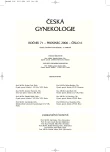-
Medical journals
- Career
Contribution and Selected Risks of Blood Transfusion
Authors: R. Kula; V. Chýlek; P. Sklienka; P. Szturz; J. Tichý; J. Neiser; J. Jahoda
Authors‘ workplace: Anesteziologicko-resuscitační klinika Fakultní nemocnice, Ostrava, přednosta MUDr. J. Jahoda
Published in: Ceska Gynekol 2006; 71(6): 494-499
Category: Original Article
Overview
Aim:
Overview of recent knowledge about risks and benefits of blood transfusion.Type of study:
Review article.Setting:
Department of Anaesthesiology and Intensive Care, University Hospital, Ostrava.Methods:
Summary of previously published data.Conclusion:
Transfusion of blood and blood products remains controversial in clinical practice. Neither indication and timing nor benefit of this procedure is clearly determined. Previously often reported complications as blood-group incompatibility and infection are less frequent now, and new transfusion’s side effects as TRIM (transfusion-related immunomodulation) and TRALI (transfusion-related lung injury) are reported with growing evidence. This risk (often underestimated in the past) is discussed in the article, and compared with blood transfusion benefits. Either restrictive or more open approach to blood transfusion are supported as well as criticised by different groups of clinicians and „good clinical practice“ definition remains open for the future.Key words:
blood transfusion, transfusion-related immunomodulation, transfusion-related lung injury
Labels
Paediatric gynaecology Gynaecology and obstetrics Reproduction medicine
Article was published inCzech Gynaecology

2006 Issue 6-
All articles in this issue
- Clinical Comparison of Laparoscopy-Assisted Vaginal Hysterectomy (LAVH) and Total Laparoscopy Hysterectomy (TLH) in Women with Benign Disease of Uterus – a Prospective Randomized Study
- The Impact of Total Abdominal and Laparoscopically Assisted Vaginal Hysterectomy on the Development of Urine Incontinence
- Glandular Premalignant Lesions of the Uterine Cervix
- Possibile Utilization the Vaginal Ultrasonography as the Prebioptic Method in Diagnostics of Cancer of Endometrium through the Mediation the So-called EMI (endometrium/myometrium index)
- New Options in Reconstructive Pelvic Floor Surgery and Surgery in Urogynecology
- A Survey of Surgical Techniques Used for the Correction of Statics Disorders of Pelvic Floor
- Placenta and Annexin V Receptors, Antibodies against Annexin V and against Other Phospholipids in Patients with Recurrent Pregnancy Loss
- Basal Concentrations of FSH (Follicle Stimulating Hormone) as a Predictor of Succes of IVF-OCSI Cycle
- Methods of Assisted Reproduction in HIV Posivtive Patients
- Cardiovascular Risk and Estrogens
- Mechanisms Influencing Implantation of the Embryo – the Last-Years’ News
- Contribution and Selected Risks of Blood Transfusion
- Hormonal Contraception Possible Interactions
- Czech Gynaecology
- Journal archive
- Current issue
- Online only
- About the journal
Most read in this issue- Clinical Comparison of Laparoscopy-Assisted Vaginal Hysterectomy (LAVH) and Total Laparoscopy Hysterectomy (TLH) in Women with Benign Disease of Uterus – a Prospective Randomized Study
- Hormonal Contraception Possible Interactions
- Placenta and Annexin V Receptors, Antibodies against Annexin V and against Other Phospholipids in Patients with Recurrent Pregnancy Loss
- The Impact of Total Abdominal and Laparoscopically Assisted Vaginal Hysterectomy on the Development of Urine Incontinence
Login#ADS_BOTTOM_SCRIPTS#Forgotten passwordEnter the email address that you registered with. We will send you instructions on how to set a new password.
- Career

